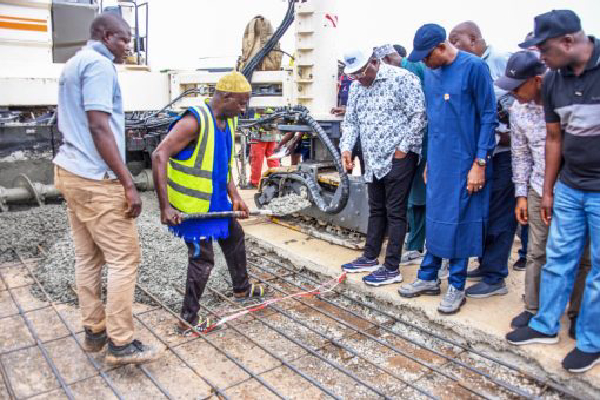The Federal Government has reaffirmed its commitment to completing the Abuja–Kaduna–Zaria–Kano expressway within the stipulated 14-month timeline, describing it as a “legacy infrastructure project” set to benefit generations to come.
Minister of Works, David Umahi, made the assurance during a site inspection on Saturday, emphasizing that the current construction is designed to last over a century, unlike previous projects that experienced prolonged delays.
Sections 1 and 3 of the expressway, spanning 118 kilometers, were awarded for ₦252 billion, with 30 percent (approximately ₦60 billion) already released following presidential approval.
Section 2 covers 72 kilometers, including 15 kilometers of flexible asphalt pavement and the remainder reinforced concrete, at a total cost of ₦507 billion, of which 30 percent (over ₦150 billion) has been disbursed. Umahi noted that the combined project cost to Kano stands at ₦761 billion.
“This is a highly courageous investment, and I commend President Bola Tinubu for prioritising the completion of these roads,” the Minister said.
He stressed that the initiative, tagged “Rebuilding Abuja–Kaduna–Zaria–Kano Road,” reflects the President’s commitment to elevating road standards in the North to match those in the South-West.
Read Also
Umahi urged contractors to maintain high-quality standards and warned that delays would compromise his integrity.
READ ALSO: Minister of Works, David Umahi takes inspection to Oyo to assess level of projects
He also called on young Nigerian engineers to embrace modern construction technologies, highlighting the President’s directive that NNPC-funded projects must be completed without abandonment.
Minister of State for Works, Alhaji Garba Umar Goronyo, lauded the contractors for their progress but urged intensified efforts to overcome setbacks caused by the rainy season.
He stressed that durable road infrastructure and bridges remain key drivers of Nigeria’s economic growth.
The Minister emphasized the importance of on-site monitoring, supervision, and collaborative problem-solving, saying, “We can’t stay in the office and know what is going on in the field. Site inspection and sharing ideas are key to the success of any engineering project.”
With federal backing and a clear completion roadmap, the expressway project is set to enhance regional connectivity, facilitate commerce, and leave a lasting legacy for Nigeria’s transport infrastructure.





